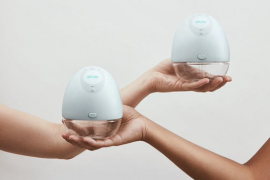Did you ever have one of those embarrassing teenage moments, growing up; when you find your skirts badly stained with menstrual blood, and you have to walk around the rest of the day with a huge cardigan tied around your waist? Many adolescent girls have had to deal with such situations, especially in developing countries with over 200 million adolescent girls living in poverty. Thanks to many recent innovations specifically designed to reduce the “Shame of Menstruation” as it is often referred. This situation is greatly reduced.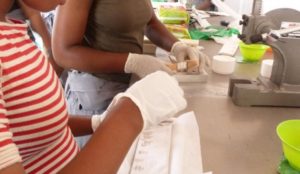
Here, Noha Zeitoun highlights 4 Innovations for women, reducing the “Shame of Menstruation”.
With about 250 million adolescent girls in the world living in poverty, having a period means having to carry a heavy burden of shame. In addition, a shortage of sufficient clean water, toilets and sanitary products in schools can limit their ability to attend school and participate in daily life activities.
As the Population Services International (PSI) continues to develop the market for toilets and sanitation across India and Africa, it has become apparent that not only does having a toilet bring dignity to entire families; it also positively affects women’s health. For girls and women, having a toilet brings dignity to menstruation and allows for the safe storage of sanitary supplies. One of the most popular features of the toilets PSI is helping to construct in India, is the small “cubby shelf” in the upper right corner that lets women store sanitary supplies for her period.
As more and more organizations are focusing on menstruation management and alleviating the burden created by period-related issues around the world with innovative solutions, market development and market research, here are four innovations that are helping girls and women cope with their periods:
Flo
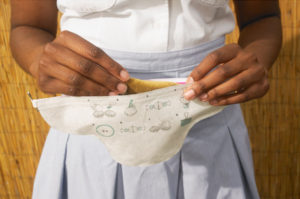
Reusable pads are an effective way to provide girls, especially those in low-income situations, access to sanitary products that are affordable and safer than unsanitary, less absorbent materials such as rags and mattress stuffing.
However, reusable pads come with a unique set of challenges. Oftentimes, reusable feminine products can cause significant health problems when not cleaned properly. Social stigma and cultural taboos about menstruation deter girls from washing their reusable pads with normal laundry and causes embarrassment when hanging the pads outside to dry after they are washed. The reusable pads then remain damp and form bacteria that can cause reproductive infections and illness. Making matters worse, many girls often decide to skip school out of fear of being embarrassed or ashamed.
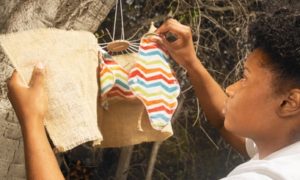
Luckily, students at the Art Center College of Design created “Flo”, a versatile period management system that allows girls to face their periods with dignity. Flo allows for longer-lasting menstruation management and is a low cost option in areas where disposable sanitary pads may be perceived as being too expensive.
Flo is a portable device that allows girls to carry, clean and dry reusable pads discretely and safely. The invention is comprised of two bowls lined with a basket casing, a string and a sealable carrier. Water and detergent go into the bowls so that the pads can be properly cleaned. The basket casing converts into a hanging rack that can be covered with a piece of cloth so that the pads can be hung discretely outside.
Thanks to Flo, periods can be safer, healthier and less disruptive to girls’ daily lives.
Period Panties for Girls
Designing for empowerment and purpose is the drive behind BeGirl, a for-profit social enterprise addressing menstruation management through revolutionary reusable period panties and pads.
BeGirl is working to close the gender gap in education that appears when girls miss school or drop out due to menstrual issues. BeGirl designs and produces two reusable options for girls, the PeriodPanty and the FlexiPad, which can be filled with safe and absorbent material, washed, and then dried indoors in less than 60 minutes. The design for both products employs soft comfortable fabric and strain-free material, as well as leak-proof lining, giving girls the confidence to wear either product to school without fears of uncomfortable accidents. BeGirl was designed with beneficiaries in mind, designed to be attractive to young girls and bring dignity in menstruation.
Not only does the design incorporate the user, but BeGirl also made sure their products were environmentally sound. BeGirl products lead to a 70% reduction in water used for washing in one year, eliminating 160 miles of walking for a girl to fetch water.
The Menstrual Man
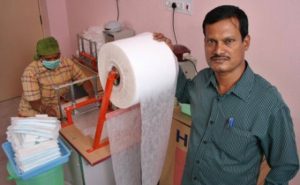
Most men avoid the topic of menstruation like the plague. But one man, Arunachalam Muruganantham of India, was shocked by how his wife was managing her monthly period that he not only sought to create a more affordable sanitary pad, but he even wore the pads himself mimicking menstruation with goat’s blood to test his designs.
In India, only 12% of women use commercial sanitary products due to their perceived high cost and the traditional stigma surrounding menstruation and sanitary pads. Instead, many women use rags, dirt, leaves to absorb menstrual blood, contributing to the 70% of female reproductive diseases resulting from poor menstrual hygiene and even impacting maternal mortality.
Almost five years after Arunachalam began his work, he developed a low-cost method to produce pads using pulverized wood fiber and built the model machine to make them, simple enough to be operated and maintained in India’s remote villages. After developing the model, he began distributing over 250 machines; today he has supplied machines to over 400 sites that benefit 1,300 villages. Each machine employees 10 women and can produce up to 250 pads a day.

Women in the villages make the pads themselves and sell directly to their customers, allowing them to not only menstruate with dignity but also create small social enterprises within their communities that benefit entire families. The women that purchase the pads are not only receiving the product, but they also receive information on how to use the pads.
A similar program by Sustainable Health Enterprises (SHE) has created social business around making sanitary pads from banana fibers in Rwanda. Banana famers process and sell their trunk fiber to SHE, which is then manufactured into sanitary pads in community factories. The factories are packaged and sold at affordable prices to women and in schools. SHE also works to educate women and young girls about the myths surrounding menstruation and about health hygiene.
Femme International
Imagine a school-aged girl learning every day in East Africa without having to worry about her monthly cycle at school.
Femme International provides school girls with not only menstrual cups but also with the education and hygiene products they need to handle their menstrual cycles each month. Each Femme Kit contains everything a girl needs to keep the cup clean and to store the cup when she does not need it.
Menstrual cups are similar to tampons as they are an internal form of menstrual management, but instead of absorbing, they collect blood and are emptied when a woman removes the cup. Menstrual cups, unlike other menstrual products, can be used for up to 12 hours allowing girls to attend school without the fear of ridicule and accidents. Cups are made from silicone and can last for 10 years, drastically reducing not only waste but also the economic strain of monthly sanitary products.
Femme’s combination of health-focused workshops and the Kit have equipped countless girls with the knowledge and resources to manage their periods every month and attend school uninterrupted.
Thanks to these innovations, girls can be more empowered to reach their full potential and not be ashamed. With the sustainable development goals on the horizon, more and more attention is being paid to the status of women and girls. Without openly discussing and finding sustainable solutions for menstrual management, the road to gender equality will be difficult. Menstruation matters, Period.
Source: Noha Zeitoun


